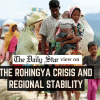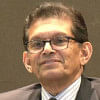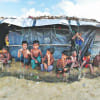Crimes against Rohingya : Myanmar not serious about probe: HRW
Human Rights Watch has said Myanmar should disband its inquiry commission on abuses in Rakhine state for its unwillingness to seriously investigate alleged grave crimes against the ethnic Rohingyas.
"The Myanmar commission's dismissal of the extensive documentation of gross human rights abuses against the Rohingya makes abundantly clear that it is not serious about seeking justice," said Brad Adams, Asia director of HRW.
He said the UN Security Council should stop giving credence to this commission and refer the situation in Myanmar to the International Criminal Court.
At a news conference on December 12, Rosario Manalo, chair of the Independent Commission of Enquiry, stated that the commission had found "no evidence" to support allegations of human rights abuses in the four months since it officially opened its investigation.
Her statement shows that the commission was disregarding evidence and testimony collected by United Nations fact-finders, the US State Department, and international human rights organisations since violence broke out in Rakhine in 2016, said the New York-based global rights body on Wednesday.
The UN Security Council, which has been negotiating its first resolution on the Rohingya crisis, should view the chair's comments as further evidence that Myanmar's commission is not a viable path to justice for victims of abuses, said HRW.
On September 18, the UN Independent International Fact-Finding Mission on Myanmar issued a 444-page report detailing crimes against humanity, war crimes, and genocide by Myanmar's security forces in Rakhine and serious human rights abuses in Shan and Kachin states.
The UN Office of the High Commissioner for Human Rights issued a "flash report" in February last year documenting extrajudicial killings, sexual violence, arbitrary detention, torture, and other abuses by Myanmar security forces in Rakhine after an attack on security posts in August 2016.
The HRW has documented the widespread use of sexual violence against the Rohingya, a massacre in the village of Tula Toli, and the widespread destruction of Rohingya villages.
Amnesty International has documented serious human rights abuses by the military in Rakhine and identified some of the military units and officers responsible for atrocities.
The US Holocaust Memorial Museum and Fortify Rights issued a joint report in November last year documenting abuses by security forces including murder, rape and other sexual violence, arbitrary detention, enforced disappearance and forced displacement.
"The record of Myanmar military abuses against the Rohingya is detailed and voluminous," Adams said. "What more do Security Council members need to know to call for justice and accountability for grave international crimes?"
The four-member commission, set up by the Myanmar government in May, is the eighth domestic commission created since violence broke out in Rakhine State in 2012.
None of these commissions have led to justice or accountability for human rights abuses such as extrajudicial killings, rape, torture and arson.
With government representatives on the commission and the military officers implicated in egregious abuses still in command, victims and witnesses are likely to be at risk.
Some witnesses who have previously provided information about abuses have faced reprisals, while Reuters journalists Wa Lone and Kyaw Soe Oo have been imprisoned for their role in exposing a massacre in Rakhine.
"Security Council members should call out the Commission of Enquiry for the diversionary and delaying tactic that it is," Adams said. "Waiting for this commission to finish its work is a waste of time that will only further delay accountability for grave human rights abuses against the Rohingya."

 For all latest news, follow The Daily Star's Google News channel.
For all latest news, follow The Daily Star's Google News channel. 








Comments